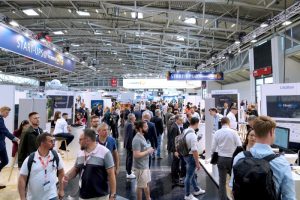 Whether it’s blizzards in the U.S. or a prolonged drought in southern Europe – the weather is not a trivial topic reserved for small talk anymore, but a significant factor in our energy supply. Both the demand and offer of electricity are increasingly weather-dependent, as the International Energy Agency (IEA) states in their Electricity Market Report 2023. “In such a world, increasing the flexibility of the power systems while ensuring security of supply and resilience will be crucial,” the agency advises.
Whether it’s blizzards in the U.S. or a prolonged drought in southern Europe – the weather is not a trivial topic reserved for small talk anymore, but a significant factor in our energy supply. Both the demand and offer of electricity are increasingly weather-dependent, as the International Energy Agency (IEA) states in their Electricity Market Report 2023. “In such a world, increasing the flexibility of the power systems while ensuring security of supply and resilience will be crucial,” the agency advises.
According to the IEA, despite the persistent growth in 2022, the share of variable renewable capacity in the total generation fleet remains below 25%, whereas in Europe it its 35%. In countries with a high share of wind and solar power, such as Germany and Denmark, variable sources already make up 60% of the total generation capacity.
As the energy transition expands, challenges are increasing
The higher the share of wind and solar power, the more difficult it is to balance these variable renewables. What we need now are not just more power grids, but – above all – smarter ones, and an increase in demand-side flexibility. Learn how this can be achieved at EM-Power Europe – the international exhibition for energy management and integrated energy solutions. It is focused on modernizing and digitalizing the power grid into a flexible smart grid, integrating prosumers, e-mobility and power-to-heat concepts into a holistic, renewable energy system, and the efficient use of renewable sources of energy.
The innovation potential here is vast, a fact which is reflected by the large number of start-ups amongst the exhibitors at EM-Power Europe. One of those start-ups is Entrix, a company that optimizes the marketing of the flexible capacity of battery storage systems. Thanks to their flexibility, battery storage systems play an important role in keeping the power grid stable, as they can react very quickly to frequency fluctuations in the grid among other things. Entrix uses smart algorithms to determine the ideal combination of revenue streams in each case, taking into account the battery’s wear and degradation. “Other companies that offer flexible energy assets are usually limited to providing balancing power. Our system, on the other hand, considers different options in real time, like whether it makes more sense to provide 100 percent balancing power, or maybe offer 70 percent of the battery capacity as balancing power and 30 percent on trading markets,” explains Steffen Schülzchen, founder and CEO of the Munich-based start-up.
 How solar power peaks reach our cellars
How solar power peaks reach our cellars
The start-up decarbon1ze is also focused on increasing energy system flexibility. In 2021, almost six terawatt-hours’ worth of electricity from renewable sources were lost because the grid was unable to absorb it. As a result, photovoltaic installations and wind power sites had to be temporarily switched off. The start-up proposes to direct this wind and solar power into the boiler rooms of our cities – ideally in areas where climate-friendly heating concepts have so far been scarce. “Our goal is to “park” wind and solar energy, which would otherwise be curtailed, in existing regional hot water buffer storages. All you have to do is retrofit the existing system with simple heating elements and appropriate metering units,” says Knut Hechtfischer, CEO and co-founder of decarbon1ze.
Last but not least, Exnaton is able to determine the price of flexibility. In future, the price of electricity in the form of dynamic tariffs will play a key role in aligning supply and demand. The Swiss start-up has developed a software platform capable of billing complex energy flows of this kind. Exnaton’s solution is primarily aimed at utility companies and municipal utilities. “Many utility companies would like to offer more flexible tariffs, but refrain from doing so because they can’t bill them. Our solution allows them to introduce new tariffs, thereby expanding their product range,” explains Dr. Liliane Ableitner, co-founder of Exnaton.
Practical sector coupling at Messe München
At EM-Power Europe, which takes place from June 14–16 in Munich, you can meet these – and many other – start-ups, as well as established companies, and discover their exciting products for the energy transition. Some companies will be showcasing their projects and solutions during presentations at the EM-Power Forum, which is included as part of your exhibition ticket. Sessions will focus on topics such as digitalization, flexibility, energy management and sector coupling. The finalists of the first EM-Power AWARD will also be presenting their innovations. The EM-Power Europe Conference will start on June 13 and is the perfect opportunity for attendees to discuss the smart integration of decentralized energy installations, grid management and flexibilities into the energy system of the future with international experts. This includes the question of how transmission and distribution grids can be stabilized given the volatile nature of power generated from renewable sources of energy and increasing demand.


